#maori movie
Explore tagged Tumblr posts
Text
Tiny Review: New Zealand Historical Fiction.

The topic is interesting. The execution is middling. I would have loved to see more buildup to the key moments in the last act.

The Convert is a 2023 film directed by Lee Tamahori, and starring Guy Pearce and Te Kohe Tuhaka.
#the convert#the convert 2023#maori#maori movie#guy pearce#te kohe tuhaka#tioreore ngatai melbourne#antonio te maioha#jacqueline mckenzie#lawrence makoare#dean o'gorman#historical drama#drama movies#action movies#2023 movies#new zealand movies#new zealand#movie review
2 notes
·
View notes
Text
I saw that Ender's Game was on Netflix so I watched it on Monday and I had a copy on hand so I reread it and I just finished my reread. Technically my 3rd read but last time was when I read the whole thing in an afternoon during lockdown (I was trying to cheat/speedrun an assignment, it didn't work) and I don't remember when it was I read it the first time, so I didn't remember most of it (I remembered the handful of major plot points I think)
Anyway point is, reading it now that I'm older and have more media literacy, HOLY SHIT. I wanted to make a post but i'm feeling like this rn

Something something the themes and the patterns and the way they all come together etc etc etc
But uh yeah read Ender's Game. ESPECIALLY if you've watched the movie. It's so much more, the movie really softens and skims over literally everything, there's one thing I like that the movie did over the book but it was a smaller thing that's now a headcanon of mine. I'll put it in the tags i guess for minor spoilers
#rambles#ender's game#the thing i liked in the movie was rackham being maori and the line about his tatoos and speaking for the dead
10 notes
·
View notes
Text
"ive nvr seen anything that focused on a queer indigenous man in my whole 27 years of life so thts why i love this racist pirate show"
Skill issue
#like .... literally.....#like even if ur talking specifically abt maori a movie came out in 2020#i didnt care enough to check if op was maori but as a 27 year old indigenous maghrebi .....literally skill issue#like you had to have indigenous queer rep spoonfed to#by hbo and the collective tumblr zietgeist ....skill issue#like yeah mb they meant to say on tv this is the first time on tv which like yeah they would have a point#but also is the character ed indigenous textually? jurys out for me lol
17 notes
·
View notes
Text
I suspect Taika Waititi put some of the modern Maori experience into the Asgardians. Admittedly, I don't know a lot about what Maori culture is like today, but as far as I know:
War/being a warrior was traditionally very important in that culture, and it is a difficult question how the traditions can be translated into a largely peaceful world.
In the past, they were an independent polity and successful conquerors, but as the result of being defeated by an enemy now they live as a minority in a state controlled by another culture and a modern capitalist economy. There is pressure to cater to that culture and economy, particularly by performing for tourists.
These are true for the Asgardians in Thor: Love & Thunder as well.
The basic problem is that much of a culture, every culture, is based on their practical way of life (how they subsist, how often they go to war, etc) and preserving a culture through a changing way of live is always an uphill battle. Western cultures have the advantage that modernity developed among them so the transition went somewhat smoother than for cultures that had it forced on them from the outside (in-between are cultures that modernized on their own under the pressure to stay competitive).
4 notes
·
View notes
Text
90 Movies in 90 Days: Boy (2010)
Every day until March 31, 2024 I will be watching and reviewing a movie that is 90 minutes or less. Title: Boy Release Date: March 25, 2010 Director: Taika Waititi Production Company: Whenua Films | Unison Films | New Zealand Film Production Fund | New Zealand Film Commission | New Zealand On Air | Te Mangai Paho Summary/Review: “Boy” (James Rolleston) is an 11-year-old Maori child whose mother…

View On WordPress
#90 Movies in 90 Days#Comedy#Coming of Age#Drama#Maori#Movie Reviews#Movies#New Zealand#Worldwide Film Challenge
0 notes
Text
Couch surfer in his 30s. Oscar winner in his 40s. Why the whole world wants Taika
**Notes: This is very long post!**
Good Weekend
In his 30s, he was sleeping on couches. By his 40s, he’d directed a Kiwi classic, taken a Marvel movie to billion-dollar success, and won an Oscar. Meet Taika Waititi, king of the oddball – and one of New Zealand’s most original creative exports.
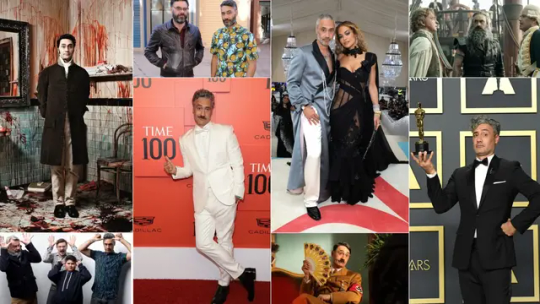
Taika Waititi: “Be a nice person and live a good life. And just don’t be an arsehole.”
The good news? Taika Waititi is still alive. I wasn’t sure. The screen we were speaking through jolted savagely a few minutes ago, with a cacophonous bang and a confused yelp, then radio silence. Now the Kiwi filmmaker is back, grinning like a loon: “I just broke the f---ing table, bro!”
Come again? “I just smashed this f---ing table and glass flew everywhere. It’s one of those old annoying colonial tables. It goes like this – see that?” Waititi says, holding up a folding furniture leg. “I hit the mechanism and it wasn’t locked. Anyway …”
I’m glad he’s fine. The stuff he’s been saying from his London hotel room could incur biblical wrath. We’re talking about his latest project, Next Goal Wins, a movie about the American Samoa soccer team’s quest to score a solitary goal, 10 years after suffering the worst loss in the game’s international history – a 31-0 ignominy to Australia – but our chat strays into spirituality, then faith, then religion.
“I don’t personally believe in a big guy sitting on a cloud judging everyone, but that’s just me,” Waititi says, deadpan. “Because I’m a grown-up.”
This is the way his interview answers often unfold. Waititi addresses your topic – dogma turns good people bad, he says, yet belief itself is worth lauding – but bookends every response with a conspiratorial nudge, wink, joke or poke. “Regardless of whether it’s some guy living on a cloud, or some other deity that you’ve made up – and they’re all made up – the message across the board is the same, and it’s important: Be a nice person, and live a good life. And just don’t be an arsehole!”
Not being an arsehole seems to have served Waititi, 48, well. Once a national treasure and indie darling (through the quirky tenderness of his breakout New Zealand films Boy in 2010 and Hunt for the Wilderpeople in 2016), Waititi then became a star of both the global box office (through his 2017 entry into the Marvel Universe, Thor: Ragnarok, which grossed more than $1.3 billion worldwide) and then the Academy Awards (winning the 2020 best adapted screenplay Oscar for his subversive Holocaust dramedy JoJo Rabbit, in which he played an imaginary Hitler).
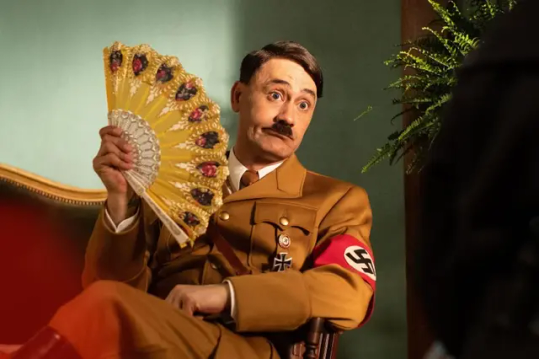
Waititi playing Adolf Hitler in the 2019 movie JoJo Rabbit. (Alamy)
A handsome devil with undeniable roguish charm, Waititi also slid seamlessly into style-icon status (attending this year’s Met Gala shirtless, in a floor-length gunmetal-grey Atelier Prabal Gurung wrap coat, with pendulous pearl necklaces), as well as becoming his own brand (releasing an eponymous line of canned coffee drinks) and bona fide Hollywood A-lister (he was introduced to his second wife, British singer Rita Ora, by actor Robert Pattinson at a barbecue).
Putting that platform to use, Waititi is an Indigenous pioneer and mentor, too, co-creating the critically acclaimed TV series Reservation Dogs, while co-founding the Piki Films production company, committed to promoting the next generation of storytellers – a mission that might sound all weighty and worthy, yet Waititi’s new wave of First Nations work is never earnest, always mixing hurt with heart and howling humour.
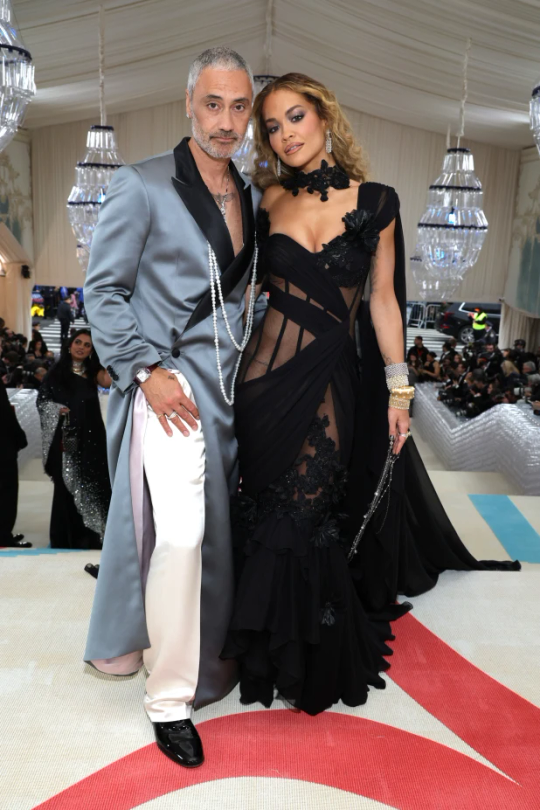
Waititi with wife Rita Ora at the 2023 Met Gala in May. (Getty Images)
Makes sense. Waititi is a byproduct of “the weirdest coupling ever” – his late Maori father from the Te Whanau-a-Apanui tribe was an artist, farmer and “Satan’s Slaves” bikie gang founder, while his Wellington schoolteacher mum descended from Russian Jews, although he’s not devout about her faith. (“No, I don’t practise,” he confirms. “I’m just good at everything, straight away.”)
He’s remained loyally tethered to his origin story, too – and to a cadre of creative Kiwi mates, including actors Jemaine Clement and Rhys Darby – never forgetting that not long before the actor/writer/producer/director was an industry maven, he was a penniless painter/photographer/ musician/comedian.
With no set title and no fixed address, he’s seemingly happy to be everything, everywhere (to everyone) all at once. “‘The universe’ is bandied around a lot these days, but I do believe in the kind of connective tissue of the universe, and the energy that – scientifically – we are made up of a bunch of atoms that are bouncing around off each other, and some of the atoms are just squished together a bit tighter than others,” he says, smiling. “We’re all made of the same stardust, and that’s pretty special.”
-----------------------------------------------
We’ve caught Waititi in a somewhat relaxed moment, right before the screen actors’ and media artists’ strike ends. He’s sensitive to the struggle but doesn’t deny enjoying the break. “I spent a lot of time thinking about writing, and not writing, and having a nice holiday,” he tells Good Weekend. “Honestly, it was a good chance just to recombobulate.”
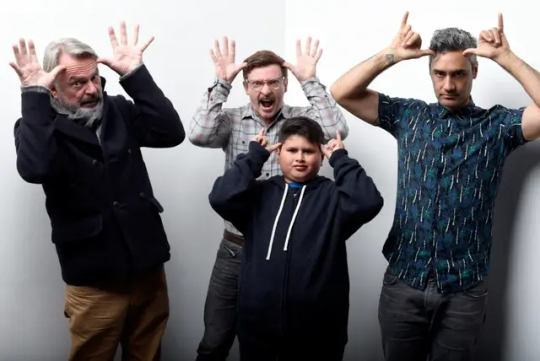
Waititi, at right, with Hunt for the Wilderpeople actors, from left, Sam Neill, Rhys Darby and Julian Dennison. (Getty Images)
It’s mid-October, and he’s just headed to Paris to watch his beloved All Blacks in the Rugby World Cup. He’s deeply obsessed with the game, and sport in general. “Humans spend all of our time knowing what’s going to happen with our day. There’s no surprises any more. We’ve become quite stagnant. And I think that’s why people love sport, because of the air of unpredictability,” he says. “It’s the last great arena entertainment.”
The main filmic touchstone for Next Goal Wins (which premieres in Australian cinemas on New Year’s Day) would be Cool Runnings (1993), the unlikely true story of a Jamaican bobsled team, but Waititi also draws from genre classics such as Any Given Sunday and Rocky, sampling trusted tropes like the musical training montage. (His best one is set to Everybody Wants to Rule the World by Tears for Fears.)
Filming in Hawaii was an uplifting experience for the self-described Polynesian Jew. “It wasn’t about death, or people being cruel to each other. Thematically, it was this simple idea, of getting a small win, and winning the game wasn’t even their goal – their goal was to get a goal,” he says. “It was a really sweet backbone.”
Waititi understands this because, growing up, he was as much an athlete as a nerd, fooling around with softball and soccer before discovering rugby league, then union. “There’s something about doing exercise when you don’t know you’re doing exercise,” he enthuses. “It’s all about the fun of throwing a ball around and trying to achieve something together.” (Whenever Waititi is in Auckland he joins his mates in a long-running weekend game of touch rugby. “And then throughout the week I work out every day. Obviously. I mean, look at me.”)
Auckland is where his kids live, too, so he spends as much time there as possible. Waititi met his first wife, producer Chelsea Winstanley, on the set of Boy in 2010, and they had two daughters, Matewa Kiritapu, 8, and his firstborn, Te Kainga O’Te Hinekahu, 11. (The latter is a derivative of his grandmother’s name, but he jokes with American friends that it means “Resurrection of Tupac” or “Mazda RX7″) Waititi and Winstanley split in about 2018, and he married the pop star Ora in 2022.
He offers a novel method for balancing work with parenthood … “Look, you just abandon them, and know that the experience will make them harder individuals later on in life. And it’s their problem,” he says. “I’m going to give them all of the things that they need, and I’m going to leave behind a decent bank account for their therapy, and they will be just like me, and the cycle will continue.”
Jokes aside – I think he’s joking – school holidays are always his, and he brings the girls onto the set of every movie he makes. “They know enough not to get in the way or touch anything that looks like it could kill you, and they know to be respectful and quiet when they need to. But they’re just very comfortable around filmmakers, which I’m really happy about, because eventually I hope they will get into the industry. One more year,” he laughs, “then they can leave school and come work for Dad.”
Theirs is certainly a different childhood than his. Growing up, he was a product of two worlds. His given names, for instance, were based on his appearance at birth: “Taika David” if he looked Maori (after his Maori grandfather) and “David Taika” if he looked Pakeha (after his white grandfather). His parents split when he was five, so he bounced between his dad’s place in Waihau Bay, where he went by the surname Waititi, and his mum, eight hours drive away in Wellington, where he went by Cohen (the last name on his birth certificate and passport).
Waititi was precocious, even charismatic. His mother Robin once told Radio New Zealand that people always wanted to know him, even as an infant: “I’d be on a bus with him, and he was that kind of baby who smiled at people, and next thing you know they’re saying, ‘Can I hold your baby?’ He’s always been a charmer to the public eye.”
He describes himself as a cool, sporty, good-looking nerd, raised on whatever pop culture screened on the two TV channels New Zealand offered in the early 1980s, from M*A*S*H and Taxi to Eddie Murphy and Michael Jackson. He was well-read, too. When punished by his mum, he would likely be forced to analyse a set of William Blake poems.
He puts on a whimpering voice to describe their finances – “We didn’t have much monneeey” – explaining how his mum spent her days in the classroom but also worked in pubs, where he would sit sipping a raspberry lemonade, doodling drawings and writing stories. She took in ironing and cleaned houses; he would help out, learning valuable lessons he imparts to his kids. “And to random people who come to my house,” he says. “I’ll say, ‘Here’s a novel idea, wash this dish,’ but people don’t know how to do anything these days.”
“Every single character I’ve ever written has been based on someone I’ve known or met or a story I’ve stolen from someone.” - Taika Waititi
He loved entertaining others, clearly, but also himself, recording little improvised radio plays on a tape deck – his own offbeat versions of ET and Indiana Jones and Star Wars. “Great free stuff where you don’t have any idea what the story is as you’re doing it,” he says. “You’re just sort of making it up and enjoying the freedom of playing god in this world where you can make people and characters do whatever you want.”
His other sphere of influence lay in Raukokore, the tiny town where his father lived. Although Boy is not autobiographical, it’s deeply personal insofar as it’s filmed in the house where he grew up, and where he lived a life similar to that portrayed in the story, surrounded by his recurring archetypes: warm grandmothers and worldly kids; staunch, stoic mums; and silly, stunted men. “Every single character I’ve ever written has been based on someone I’ve known or met,” he says, “or a story I’ve stolen from someone.”
He grew to love drawing and painting, obsessed early on with reproducing the Sistine Chapel. During a 2011 TED Talk on creativity, Waititi describes his odd subject matter, from swastikas and fawns to a picture of an old lady going for a walk … upon a sword … with Robocop. “My father was an outsider artist, even though he wouldn’t know what that meant,” Waititi told the audience in Doha. “I love the naive. I love people who can see things through an innocent viewpoint. It’s inspiring.”
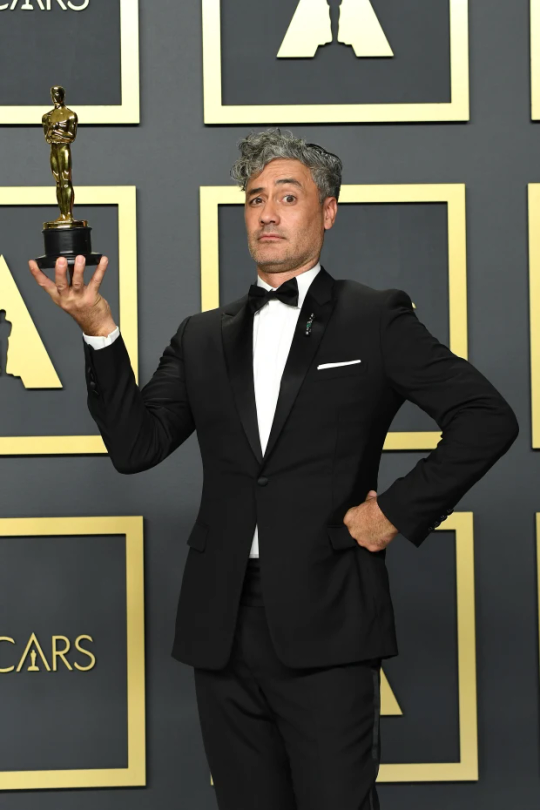
After winning Best Adapted Screenplay Academy Award for JoJo Rabbit in 2020. (Getty Images)
It was an interesting time in New Zealand, too – a coming-of-age decade in which the Maori were rediscovering their culture. His area was poor, “but only financially,” he says. “It’s very rich in terms of the people and the culture.” He learned kapa haka – the songs, dances and chants performed by competing tribes at cultural events, or to honour people at funerals and graduations – weddings, parties, anything. “Man, any excuse,” he explains. “A big part of doing them is to uplift your spirits.”
Photography was a passion, so I ask what he shot. “Just my penis. I sent them to people, but we didn’t have phones, so I would print them out, post them. One of the first dick pics,” he says. Actually, his lens was trained on regular people. He watches us still – in airports, restaurants. “Other times late at night, from a tree. Whatever it takes to get the story. You know that.”
He went to the Wellington state school Onslow College and did plays like Androcles and the Lion, A Midsummer Night’s Dream and The Crucible. His crew of arty students eventually ended up on stage at Bats Theatre in the city, where they would perform haphazard comedy shows for years.
“Taika was always rebellious and wild in his comedy, which I loved,” says his high school mate Jackie van Beek, who became a longtime collaborator, including working with Waititi on a Tourism New Zealand campaign this year. “I remember he went through a phase of turning up in bars around town wearing wigs, and you’d try and sit down and have a drink with him but he’d be doing some weird character that would invariably turn up in some show down the track.”
He met more like-minded peers at Victoria University, including Jemaine Clement (who’d later become co-creator of Flight of the Conchords). During a 2019 chat with actor Elijah Wood, Waititi describes he and Clement clocking one another from opposite sides of the library one day: a pair of Maoris experiencing hate at first sight, based on a mutual suspicion of cultural appropriation. (Clement was wearing a traditional tapa cloth Samoan shirt, and Waititi was like: “This motherf---er’s not Samoan.” Meanwhile, Waititi was wearing a Rastafarian beanie, and Clement was like, “This motherf---er’s not Jamaican.”)
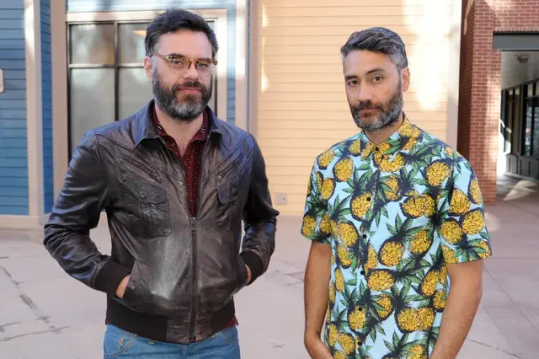
With Jemaine Clement in 2014. (Getty Images)
But they eventually bonded over Blackadder and Fawlty Towers, and especially Kenny Everett, and did comedy shows together everywhere from Edinburgh to Melbourne. Waititi was almost itinerant, spending months at a time busking, or living in a commune in Berlin. He acted in a few small films, and then – while playing a stripper on a bad TV show – realised he wanted to try life behind the camera. “I became tired of being told what to do and ordered around,” he told Wellington’s Dominion Post in 2004. “I remember sitting around in the green room in my G-string thinking, ‘Why am I doing this? Just helping someone else to realise their dream.’ ”
He did two strong short films, then directed his first feature – Eagle vs Shark (2007) – when he was 32. He brought his mates along (Clement, starring with Waititi’s then-girlfriend Loren Horsley), setting something of a pattern in his career: hiring friends instead of constantly navigating new working relationships. “If you look at things I’m doing,” he tells me, “there’s always a few common denominators.”
Sam Neill says Waititi is the exemplar of a new New Zealand humour. “The basis of it is this: we’re just a little bit crap at things.”
This gang of collaborators shares a common Kiwi vibe, too, which his longtime friend, actor Rhys Darby, once coined “the comedy of the mundane”. Their new TV show, Our Flag Means Death, for example, leans heavily into the mundanity of pirate life – what happens on those long days at sea when the crew aren’t unsheathing swords from scabbards or burying treasure.
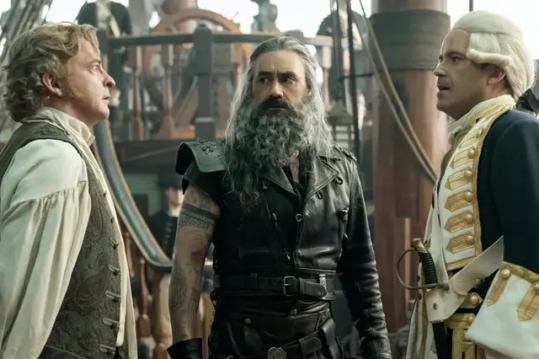
Waititi plays pirate captain Blackbeard, centre, in Our Flag Means Death, with Rhys Darby, left, and Rory Kinnear. (Google Images)
Sam Neill, who first met Waititi when starring in Hunt for the Wilderpeople, says Waititi is the exemplar of a new New Zealand humour. “And I think the basis of it is this,” says Neill. “We’re just a little bit crap at things, and that in itself is funny.” After all, Neill asks, what is What We Do in The Shadows (2014) if not a film (then later a TV show) about a bunch of vampires who are pretty crap at being vampires, living in a pretty crappy house, not quite getting busted by crappy local cops? “New Zealand often gets named as the least corrupt country in the world, and I think it’s just that we would be pretty crap at being corrupt,” Neill says. “We don’t have the capacity for it.”
Waititi’s whimsy also spurns the dominant on-screen oeuvre of his homeland – the so-called “cinema of unease” exemplified by the brutality of Once Were Warriors (1994) and the emotional peril of The Piano (1993). Waititi still explores pathos and pain, but through laughter and weirdness. “Taika feels to me like an antidote to that dark aspect, and a gift somehow,” Neill says. “And I’m grateful for that.”
-----------------------------------------------
Something happened to Taika Waititi when he was about 11 – something he doesn’t go into with Good Weekend, but which he considered a betrayal by the adults in his life. He mentioned it only recently – not the moment itself, but the lesson he learnt: “That you cannot and must not rely on grown-ups to help you – you’re basically in the world alone, and you’re gonna die alone, and you’ve just gotta make it all for yourself,” he told Irish podcast host James Brown. “I basically never forgave people in positions of responsibility.”
What does that mean in his work? First, his finest films tend to reflect the clarity of mind possessed by children, and the unseen worlds they create – fantasies conjured up as a way to understand or overcome. (His mum once summed up the main message of Boy: “The unconditional love you get from your children, and how many of us waste that, and don’t know what we’ve got.”)
Second, he’s suited to movie-making – “Russian roulette with art” – because he’s drawn to disruptive force and chaos. And that in turn produces creative defiance: allowing him to reinvigorate the Marvel Universe by making superheroes fallible, or tell a Holocaust story by making fun of Hitler. “Whenever I have to deal with someone who’s a boss, or in charge, I challenge them,” he told Brown, “and I really do take whatever they say with a pinch of salt.”
It’s no surprise then that Waititi was comfortable leaping from independent films to the vast complexity of Hollywood blockbusters. He loves the challenge of coordinating a thousand interlocking parts, requiring an army of experts in vocations as diverse as construction, sound, art, performance and logistics. “I delegate a lot,” he says, “and share the load with a lot of people.”
“This is a cool concept, being able to afford whatever I want, as opposed to sleeping on couches until I was 35.” - Taika Waititi
But the buck stops with him. Time magazine named Waititi one of its Most Influential 100 People of 2022. “You can tell that a film was made by Taika Waititi the same way you can tell a piece was painted by Picasso,” wrote Sacha Baron Cohen. Compassionate but comic. Satirical but watchable. Rockstar but auteur. “Actually, sorry, but this guy’s really starting to piss me off,” Cohen concluded. “Can someone else write this piece?”
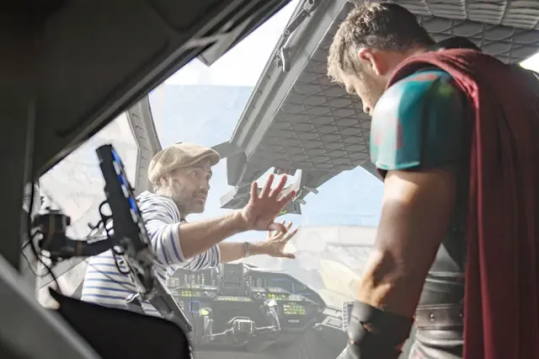
Directing Chris Hemsworth in 2017 in Thor: Ragnarok, which grossed more than $1.3 billion at the box office. (Alamy)
I’m curious to know how he stays grounded amid such adulation. Coming into the game late, he says, helped immensely. After all, Waititi was 40 by the time he left New Zealand to do Thor: Ragnarok. “If you let things go to your head, then it means you’ve struggled to find out who you are,” he says. “But I’ve always felt very comfortable with who I am.” Hollywood access and acclaim – and the pay cheques – don’t erase memories of poverty, either. “It’s more like, ‘Oh, this is a cool concept, being able to afford whatever I want, as opposed to sleeping on couches until I was 35.’ ” Small towns and strong tribes keep him in check, too. “You know you can’t piss around and be a fool, because you’re going to embarrass your family,” he says. “Hasn’t stopped me, though.”
Sam Neill says there was never any doubt Waititi would be able to steer a major movie with energy and imagination. “It’s no accident that the whole world wants Taika,” he says. “But his seductiveness comes with its own dangers. You can spread yourself a bit thin. The temptation will be to do more, more, more. That’ll be interesting to watch.”
Indeed, I find myself vicariously stressed out over the list of potential projects in Waititi’s future. A Roald Dahl animated series for Netflix. An Apple TV show based on the 1981 film Time Bandits. A sequel to What We Do In The Shadows. A reboot of Flash Gordon. A gonzo horror comedy, The Auteur, starring Jude Law. Adapting a cult graphic novel, The Incal, as a feature. A streaming series based on the novel Interior Chinatown. A film based on a Kazuo Ishiguro bestseller. Plus bringing to life the wildly popular Akira comic books. Oh, and for good measure, a new instalment of Star Wars, which he’s already warned the world will be … different.
“It’s going to change things,” he told Good Morning America. “It’s going to change what you guys know and expect.”
Did I say I was stressed for Waititi? I meant physically sick.
“Well…” he qualifies, “some of those things I’m just producing, so I come up with an idea or someone comes to me with an idea, and I shape how ‘it’s this kind of show’ and ‘here’s how we can get it made.’ It’s easier for me to have a part in those things and feel like I’ve had a meaningful role in the creative process, but also not having to do what I’ve always done, which is trying to control everything.”
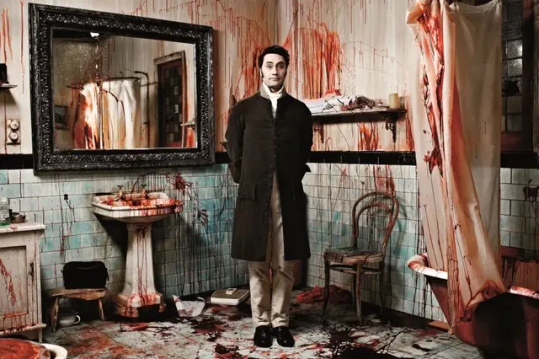
In the 2014 mockumentary horror film What We Do in the Shadows, which he co-directed with Jemaine Clement. (Alamy)
What about moving away from the niche New Zealand settings he represented so well in his early work? How does he stay connected to his roots? “I think you just need to know where you’re from,” he says, “and just don’t forget that.”
They certainly haven’t forgotten him.
Jasmin McSweeney sits in her office at the New Zealand Film Commission in Wellington, surrounded by promotional posters Waititi signed for her two decades ago, when she was tasked with promoting his nascent talent. Now the organisation’s marketing chief, she talks to me after visiting the heart of thriving “Wellywood”, overseeing the traditional karakia prayer on the set of a new movie starring Geoffrey Rush.
Waititi isn’t the first great Kiwi filmmaker – dual Oscar-winner Jane Campion and blockbuster king Peter Jackson come to mind – yet his particular ascendance, she says, has spurred unparalleled enthusiasm. “Taika gave everyone here confidence. He always says, ‘Don’t sit around waiting for people to say, you can do this.’ Just do it, because he just did it. That’s the Taika effect.”
-----------------------------------------------
Taika David Waititi is known for wearing everything from technicolour dreamcoats to pineapple print rompers, and today he’s wearing a roomy teal and white Isabel Marant jumper. The mohair garment has the same wispy frizz as his hair, which curls like a wave of grey steel wool, and connects with a shorn salty beard.
A stylish silver fox, it wouldn’t surprise anyone if he suddenly announced he was launching a fashion label. He’s definitely a commercial animal, to the point of directing television commercials for Coke and Amazon, along with a fabulous 2023 spot for Belvedere vodka starring Daniel Craig. He also joined forces with a beverage company in Finland (where “taika” means “magic”) to release his coffee drinks. Announcing the partnership on social media, he flagged that he would be doing more of this kind of stuff, too (“Soz not soz”).
Waititi has long been sick of reverent portrayals of Indigenous people talking to spirits.
There’s substance behind the swank. Fashion is a creative outlet but he’s also bought sewing machines in the past with the intention of designing and making clothes, and comes from a family of tailors. “I learnt how to sew a button on when I was very young,” he says. “I learnt how to fix holes or patches in your clothes, and darn things.”
And while he gallivants around the globe watching Wimbledon or modelling for Hermès at New York Fashion Week, all that glamour belies a depth of purpose, particularly when it comes to Indigenous representation.
There’s a moment in his new movie where a Samoan player realises that their Dutch coach, played by Michael Fassbender, is emotionally struggling, and he offers a lament for white people: “They need us.” I can’t help but think Waititi meant something more by that line – maybe that First Nations people have wisdom to offer if others will just listen?
“Weeelllll, a little bit …” he says – but from his intonation, and what he says next, I’m dead wrong. Waititi has long been sick of reverent portrayals of Indigenous people talking to kehua (spirits), or riding a ghost waka (phantom canoe), or playing a flute on a mountain. “Always the boring characters,” he says. “They’ve got no real contemporary relationship with the world, because they’re always living in the past in their spiritual ways.”
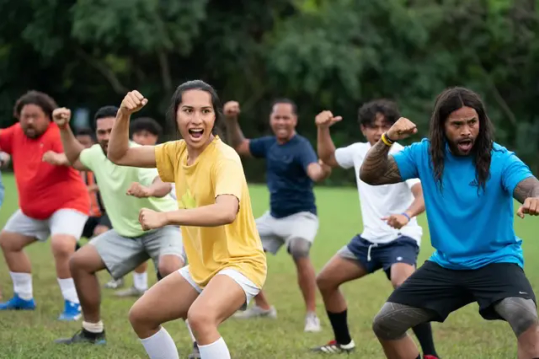
A scene from Next Goal Wins, filmed earlier this year. (Alamy)
He’s part of a vanguard consciously poking fun at those stereotypes. Another is the Navajo writer and director Billy Luther, who met Waititi at Sundance Film Festival back in 2003, along with Reservation Dogs co-creator Sterlin Harjo. “We were this group of outsiders trying to make films, when nobody was really biting,” says Luther. “It was a different time. The really cool thing about it now is we’re all working. We persevered. We didn’t give up. We slept on each other’s couches and hung out. It’s like family.”
Waititi has power now, and is known for using Indigenous interns wherever possible (“because there weren’t those opportunities when I was growing up”), making important introductions, offering feedback on scripts, and lending his name to projects through executive producer credits, too, which he did for Luther’s new feature film, Frybread Face and Me (2023).
He called Luther back from the set of Thor: Love and Thunder (2022) to offer advice on working with child actors – “Don’t box them into the characters you’ve created,” he said, “let them naturally figure it out on their own” – but it’s definitely harder to get Waititi on the phone these days. “He’s a little bitch,” Luther says, laughing. “Nah, there’s nothing like him. He’s a genius. You just knew he was going to be something. I just knew it. He’s my brother.“
I’ve been asked to explicitly avoid political questions in this interview, probably because Waititi tends to back so many causes, from child poverty and teenage suicide to a campaign protesting offshore gas and oil exploration near his tribal lands. But it’s hard to ignore his recent Instagram post, sharing a viral video about the Voice to Parliament referendum starring Indigenous Aussie rapper Adam Briggs. After all, we speak only two days after the proposal is defeated. “Yeah, sad to say but, Australia, you really shat the bed on that one,” Waititi says, pausing. “But go see my movie!”
About that movie – the early reviews aren’t great. IndieWire called it a misfire, too wrapped in its quirks to develop its arcs, with Waititi’s directorial voice drowning out his characters, while The Guardian called it “a shoddily made and strikingly unfunny attempt to tell an interesting story in an uninteresting way”. I want to know how he moves past that kind of criticism. “For a start, I never read reviews,” he says, concerned only with the opinion of people who paid for admission, never professional appraisals. “It’s not important to me. I know I’m good at what I do.”
Criticism that Indigenous concepts weren’t sufficiently explained in Next Goal Wins gets his back up a little, though. The film’s protagonist, Jaiyah Saelua, the first transgender football player in a FIFA World Cup qualifying match, is fa’afafine – an American Samoan identifier for someone with fluid genders – but there wasn’t much exposition of this concept in the film. “That’s not my job,” Waititi says. “It’s not a movie where I have to explain every facet of Samoan culture to an audience. Our job is to retain our culture, and present a story that’s inherently Polynesian, and if you don’t like it, you can go and watch any number of those other movies out there, 99 per cent of which are terrible.”
*notes: (there is video clip in the article)
Waititi sounds momentarily cranky, but he’s mostly unflappable and hilarious. He’s the kind of guy who prefers “Correctumundo bro!” to “Yes”. When our video connection is too laggy, he plays up to it by periodically pretending to be frozen, sitting perfectly still, mouth open, his big shifting eyeballs the only giveaway.
He’s at his best on set. Saelua sat next to him in Honolulu while filming the joyous soccer sequences. “He’s so chill. He just let the actors do their thing, giving them creative freedom, barely interjecting unless it was something important. His style matches the vibe of the Pacific people. We’re a very funny people. We like to laugh. He just fit perfectly.”
People do seem to love working alongside him, citing his ability to make productions fresh and unpredictable and funny. Chris Hemsworth once said that Waititi’s favourite gag is to “forget” that his microphone is switched on, so he can go on a pantomime rant for all to hear – usually about his disastrous Australian lead actor – only to “remember” that he’s wired and the whole crew is listening.
“I wouldn’t know about that, because I don’t listen to what other people say about anything – I’ve told you this,” Waititi says. “I just try to have fun when there’s time to have fun. And when you do that, and you bring people together, they’re more willing to go the extra mile for you, and they’re more willing to believe in the thing that you’re trying to do.”
Yes, he plays music between takes, and dances out of his director’s chair, but it’s really all about relaxing amid the immense pressure and intense privilege of making movies. “Do you know how hard it is just to get anything financed or green-lit, then getting a crew, getting producers to put all the pieces together, and then making it to set?” Waititi asks. “It’s a real gift, even to be working, and I feel like I have to remind people of that: enjoy this moment.”
Source: The Age
By: Konrad Marshall (December 1, 2023)
198 notes
·
View notes
Text
TOBY STEPHENS IN A MĀORI GOTHIC HORROR MOVIE FILMING IN AOTEAROA WHAT THE FUCK HOLY SHIT
42 notes
·
View notes
Note
Do you have any thoughts on the fact that in first scenario Spider was supposed be from Mexico and his name was Javier?
I don't think we ever had any real confirmation of original-Spider's ethnicity or nationality, but when his name was first announced as "Javier Socorro" a lot of people assumed he would be Latino Hispanic (from a Latin American country) instead of White Hispanic (from Spain) like he ended up being. That meant he very well could've been Mexican, or at least half-Mexican on his mom's side since I think he was always intended to be Quaritch's son. I believe they changed his first name to "Miles" to make the connection to Quaritch more obvious.
If Spider had been Mexican, it wouldn't have really changed anything in The Way of Water. He's still a human, and being a different color wouldn't change the way the other characters perceive him. The only thing that would've been different is that he wouldn't have had the nickname "monkey boy/monkey mascot," since having Sigourney Weaver and Stephen Lang calling a Hispanic kid monkey would NOT have gone over well.
Even though making him a different ethnicity wouldn't have changed the movie itself, I actually think it might've changed the way he was perceived by the audience.
This is a thought I've had in the back of my head for a long time, and this question finally gave me a reason to type it all out. But before I get into it, I do want to say that I am white and American, so I'm speaking from the perspective of a white American when I make this analysis of Spider's character and how he was perceived by American audiences. Now let's get into it:
Spider was a pretty controversial character. A lot of people hated him, but there was also a minority of people who really loved him too (me lol). Some people hated him because they felt like Neteyam's death was his fault or because they didn't like that he saved Quaritch in the end, which are reasons that wouldn't change because of his ethnicity, but there were also people who hated him because of his appearance. Spider was often described as "feeling out of place" and off-putting to some viewers. After I saw the Way of Water with my cousins, one of them (he is also white) told me that he hated Spider. When I asked him why, he shrugged and said, "he's a white boy with dreadlocks!" like that was the only reason he needed.
Now I'm just speculating here, but I think a small part of the reason why so many people can't stand Spider might be because he is white. Not because of racism against white people, but because of the context in which Spider exists as a white person. The Na'vi are very obvious allegories for indigenous American, African, and Maori people, and the RDA is a very obvious allegory for European colonizers and US corporations that exploited those groups. I can't speak for the rest of the world, but in America there are social controversies over white American people taking items that are culturally significant to other groups and wearing them as costumes. I know there's a lot of controversy over what is and isn't cultural appropriation, but when it comes to specifically white people wearing specifically Native American clothing, it's generally regarded negatively since most Native American people have said it's disrespectful because the clothing has cultural and spiritual significance.
And then we have Spider, who is not only white, but is also the son of two people who actively harmed the Na'vi, and he wears Na'vi clothing.
In the context of the Avatar movies, it makes perfect sense that Spider would dress and act the way that he does. He was raised alongside the Na'vi so it's all he knows. If you were going to fit Spider into the greater allegory of Avatar, he is similar to the historical figure, Olive Oatman. When Oatman was a child in the 1800s, her family was killed by a group of Native Americans, and she and her sister ended up being taken in by the Mohave people. She lived with them for several years before returning to a white settlement, and during that time she was assimilated into the Mohave tribe, wearing their clothing and receiving traditional tattoos. (Her story is super interesting, you should totally read more about it!). Spider is like a sci-fi version of Oatman, since his parents were killed by natives and he ended up being taken in by them and assimilating into their culture. In the context of modern day culture, a white woman getting Mohave tattoos would be considered appropriation, but in the context of Oatman's situation, it makes sense. Same thing with Spider. In-universe, adopting Omaticaya culture makes sense.



However, if you look at Spider through the lens of modern American cultural context, he looks an awful lot like a white kid dressing up in the traditional clothing of a culture his people harmed. If Spider had been raised on earth and was actively benefiting from the RDA's exploitation of Pandora, then what he's doing would be considered appropriation. But he wasn't. Even though that's not what Spider is, the association is still there. So when people see this "white boy with dreadlocks" as my cousin put it, they feel like there's something wrong with what they're looking at because they associate his appearance with cultural appropriation. I think if Spider had been cast as Latino, he might have been received a bit more favorably by the audience.
Once again, this is all just speculation, I don't really know if Spider's perception would've been different if he'd been a different ethnicity, and I acknowledge that most of the hate Spider received had to do with his character actions. However, I do believe that American audiences may have been partly influenced by the concept of cultural appropriation, which is where that feeling of Spider being "off-putting" comes from. I think it's definitely where my cousin's dislike of him comes from, since it's not about anything he did, but rather how he looks like.
63 notes
·
View notes
Text
other ppl: get depressed bc we dont live on a planet like pandora
me *banging pots and pans* WE DO. WE DO THATS THE POINT. the neural network is real. the energy network is real. this planet is insanely wonderous, its mindblowing and we dont even understand all of it. for most of human nature we have had much more of a connection to it, all of us!!! but we have forgotten and are destroying it for self gain!!! problamatic aspects and all, james cameron most likely went to south america, tripped on ayahuasca with indigeneous people, Saw and Understood, was upset by their struggles and modern society,, and made something to try to get that point across!! you're depressed by the modern world not because its so different from pandora but because our world is so similar!!!! you Are on pandora damn it fight while you still have it Thats The Point
ppl: blue people avatar is so unrealistic, damn tree hugging movie
the actual earth we live on: plants are speaking to each other and connected. fungi spread across the world and connect plants in a way incredibly remarkablely similar to the human brains nervous system. they communicate to each other, they talk. if you take a psychadelic like jake did in that deleted scene you will literally feel and see and become part of the energy network which bind everything together. when you hug a tree it does literally react to you. the world is sentient and we are arrogant and have forgotten this
#also like. yes i know opinions are very split#...... but literally the amazon tribes that he got the original movie idea for. saw the movie. and liked it. and send him a message to come#and meet them. and he did#and hes poured and a lot of time and money into it and made docs and such#to try to raise awareness for them and the destruction of both their forests and traditional lifestyles in the face of capitalism#...... and the second movie; he worked with several maori tribes for extended periods of time#so.... not exactly as easy as saying he just made something problamatic and offensive that needs to be canceled
12 notes
·
View notes
Note
I definitely don't think Avatar is above criticism and we should always be evaluating movies, but as someone with North American indigenous ancestry, I will say that one thing I've always appreciated is that James Cameron hires actual indigenous actors and consults them on the project. In Avatar 1 a lot of the background Na'vi were indigenous, including most famously the actor who played Eytukan who is Cherokee. Avatar 2 stepped that up even more and had a lot of Maori actors involved as well as doing the filming in New Zealand and working with a native New Zealand studio to help with accuracy. Again, are the movies perfect? No. And indigenous people who are offended have every right to be along with those who actually love the representation. It's a complicated issue with people on both sides. However, I do think there is an effort by James Cameron in trying to accurately represent and honor the cultures he is depicting by actively involving members of those communities which has always made me glad and is better than 99% of movies made today.
☝️
204 notes
·
View notes
Text
The Stories We Are Missing

I hate Disney. I really do. I hate them, because they are shitty to a lot of workers. I hate them, because they consolidate so many IPs only to then make the most generic stuff with them. I hate them, because they don't invest in new ideas anymore. And I hate them for being such cowards.
However... I will give them credit for producing Iwájú and Kizazi Moto. Two afrofuturist series. Iwájú being one series that actually just tells one story - while Kizazi Moto is an anthology series like Love Death + Robots on Netflix. Well, that is all that it has in common with LD+R is that it is a scifi anthology series. It has less issues with the sexism and racism of LD+R.
And thinking about this has brought me to the one aspect of our lack on Solarpunk media, that I think gets ignored too much. Again, because white people. And this is... Well, the lack of well published afrofuturist and amazofuturist stories - or movies. And I would assume also the equivalent for other indigenous cultures. (I think the name right now is "Pacificafuturism" for the polynesians, I have no idea whether the indigenous people still living in Asia have something along the lines.)
The irony is that I actually think, well... Let's face it: There is a reason why Disney of all people is investing in some Afrofuturist projects. And that reason is that there is a big audience for this stuff. Disney probably just saw how Black Panther was printing money and was like: "I guess we'll make more of that!"
Now what does this have to do with Solarpunk?
Well, I will remind you: Solarpunk originated with Amazofuturism. And futuristic indigenous stories tend to have a lot of Solarpunk vibes at the very least. Not all of those stories will be Solarpunk, no, but even those that are not will offer us things to learn. Because I will say it once again: We really, really do have a big issue in a lot of SciFi/Fantasy that way too white and way too stuck in the storytelling conventions of western society.
And here is the thing: I doubt most people will be able to name a lot of afrofuturist media other than Black Panther, and maybe the series above. Or maybe you actually can think of some novels like the ones from N. K. Jemisin, Octavia E. Butler, or Nnedi Okorafor. But not much more.
Now, in terms of Afrofuturism there is a bit more - but the other things? Most Amazofuturism is only ever published in Portugese or maybe Spanish in some cases. And I am honestly not certain if there is even anything that is not self-published out there in terms of Pacificafuturism. (I mean, I know a few Maori movies that I guess you could consider, but...)
What I am trying to get at: I think we need more indigenous futurism/indigenous scifi. Not only so that we read more that breaks out of western storytelling conventions, I think we also just need other perspectives on the future. Because our western, white perspective is limited - and we got to imagine the future for way too long.
#solarpunk#lunarpunk#afrofuturism#amazofuturism#indigenous futurism#indigenous stories#science fiction#fantasy#kizazi moto#iwaju#black panther
37 notes
·
View notes
Note
support portraying Māori polynesian features on Māori polynesian characters! #unwhitewashtbb
no so true!! for my omega portrait i made sure to reference a maori actress, in this case young keisha castle-hughes in the movie whale rider bc i felt her features match omega's pretty well


69 notes
·
View notes
Text
I'm rewatching OFMD with some friends and it's hitting me like a truck how awful Izzy is, how much his actions are whitewashed by a lot of fans and how capital F fandom keeps tripping over the same stone with the depiction of abuse.
The same scenario happens constantly where an abusive character played by a conventionally attractive guy, usually with dark hair and a British accent can commit the most horrific acts and fandom will treat the character as a poor little meow meow. The kicker is that a lot of the time, the abuse they inflict is upon people who are in some way bucking against fascism/toxic masculinity/gender norms/imperialism, etc. Those people are also overwhelmingly women, people of color or just vulnerable in one way or another.
Some notable examples include:
Kylo Ren: Wannabe fascist who brutally tortures the female lead in a scene that heavily echoes sexual assault. Brutalizes the Black male lead so badly he's in a coma by the end of the 1st movie. Fandomized as a PLMM immediately, treated like nothing is his fault and the real bad guy has twisted his mind. Also has Finn's every good trait slapped onto him, including the love interest role.
Izzy Hands: Emotionally and physically abuses the Maori co-protagonist. His actions include selling him out to the English, telling him he should have let the English kill him and threatening him with violence if he doesn't behave the way he wants him to. Extends the same treatment to the gender nonconforming white male lead. Fandomized as a PLMM since the 1st season and treated as a suicidal abuse victim, basically putting all of Edward's traits onto him.
Loki from the MCU. Manipulates and undermines his brother's actions out of pure jealousy. When said brother starts to break away from the imperialistic mindset he was raised into, he straight up kills him and then continues his family's streak of colonialism, despite being from a colonized world himself. Proceeds to never take responsibility for his actions all while treating every female character (who isn't his gender flipped self) like dirt. Fandomized as a PLMM immediately, treated like the read villain has twisted his mind, has all of Thor's traits and experiences slapped onto him. Are we seeing a pattern yet?
Snape and Draco Malfoy from YouKnowWhere: Relentlessly bully children and their peers, are openly bigoted against non magic users and poor people even if they meet all other criteria for blood purity and never express regret or shame in the entire franchise. Fandomized as PLMMs eventually (once the characters playing them were hot).
Do notice, those are all either media for kids/teens or media for adults that isn't exactly subtle in its message. The abuse is not hidden in between the layers. The characters act openly. And yet, there's this insistence to rewrite villains that are actively fighting to preserve the abusive status quo as noble heroes. Are we sure fandom is always progressive and righting the wrongs of canon. Are we really sure?
I don't have a solution here. I'm just describing a phenomenon. And it's driving me a bit insane, ngl.
#anti izzy hands#anti loki#anti draco malfoy#anti severus snape#anti kylo ren#see I'm tagging it#don't eat me
19 notes
·
View notes
Note
Not Disney having maui being abandoned at birth (like in thr maori myth) in the first movie. Then making it seem like even the gods hate him in the second film. I know traditionally maui doesn't get along with anyone but i feel like they demonized the storm god
I don’t know if gods hates him. Only Nalo seems to hate him, but also Nalo hates humans so..
10 notes
·
View notes
Text
Fan craft: Iolaus' pendant





I have wanted to make my own pendant for years, and I finally did it!
I started with twisting and forming aluminum wrap until I had a base shape and size I was happy with. And then I used modelling putty over many sessions to add volume to it and to whittle and smooth it into the final shape. And then a few layers of paint.
It's not a perfect replica, but I'm so very happy with how it turned out!
In the show Iolaus has inherited the pendant from his father and he wears it from his very first appearance and throughout the show.
In real life the pendant is a maori symbol, a manaia - a way for the show to pray a little bit of tribute to Aotearoa/New Zealand where the show was filmed. The manaia is a spiritual guardian of sorts and when worn as a pendant it is believed to protect its wearer from evil.
The original pendant that Michael Hurst wore (for the movies and first season) was made of traditional pounamu (green stone), but after the pendant hit him in the face during a fight scene and chipped a tooth they molded a plastic version for him to wear instead, and a foam version for fight scenes.
19 notes
·
View notes
Text
in my my mind there is an epic movie that's a comedy and the three main characters are australian aboriginal, maori and indigenous american and they all get up to fucking shenanigans. unfortunately it lives in my head and nowhere else because i'm fucking poor but i promise ya it's funny.
17 notes
·
View notes